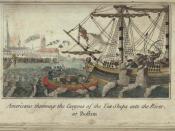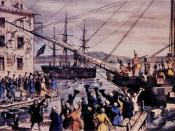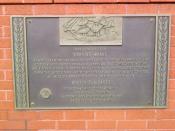Many patriots were responsible for much anti-British sentiment in the colonies. Both men, and women, had equal contributions, some in groups, and others individually.
In 1763, a band of frontiersmen, known as The Paxton Boys descended on Philadelphia to demand relief and financial support for defense against Indians. This action was minor, but made a big impact because it influenced many other people to begin speaking out.
Later, in the summer of 1765, the largest group against the Stamp Act was in Boston where men belonging to the newly organized, Sons of Liberty, terrorized pro-British aristocrats and destroyed the lieutenant governor's home. This was one of the first acts of violence towards pro-British to try to instill fear in their hearts. Also, in 1765, Patrick Henry made a dramatic speech to the House, concluding with a vague prediction that if present policies weren't revised, George III, like earlier tyrants, would lose his head.
Henry introduced a set of resolutions declaring that Americans possessed the same rights as the English, especially the right to be taxed by their own representatives; the Virginians should pay no taxes except those voted by the Virginia assembly, and that anyone advocating the right of Parliament to tax should be deemed an enemy of the colony. Henry's resolutions were printed and circulated as the "Virginia Resolves." Media played a huge part in the anti-British sentiment because it was widespread, and it impacted many.
In Massachusetts James Otis persuaded his fellow members of the colonial assembly to call an inter colonial congress to take action against the new tax. Stamp Act congress met in New York with delegates from nine colonies. In a petition to the British government the congress denied that the colonies could rightfully be taxed except through their own provincial assemblies.
On the night...


